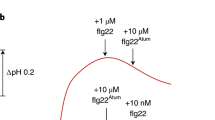Abstract
The flagellins purified from Pseudomonas syringae pv. tabaci induce a hypersensitive reaction in nonhost tomato cells. To investigate the role of flagella and flagellin in the compatible interaction, we generated two types of flagella-defective mutant. The ΔfliC mutant lost the fliC gene that encodes flagellin protein, whereas the ΔfliD mutant lost the fliD gene that encodes HAP2-capping protein. The two mutants had markedly reduced ability to cause disease symptoms in tobacco leaves. Furthermore, propagation of the mutants in tobacco leaves was less than that in wild-type pv. tabaci. Compared to the inoculation with wild-type pv. tabaci, inoculation with the two mutants did not markedly induce the expression of typical defense response-related genes such as PAL and hsr203J. Complementation of each fliC and fliD gene to the corresponding deficient mutant restored motility and virulence. These results indicate that flagella of P. syringae pv. tabaci are indispensable organelles for complete virulence on host tobacco plants.
Similar content being viewed by others

Author information
Authors and Affiliations
Corresponding author
Rights and permissions
About this article
Cite this article
Ichinose, Y., Shimizu, R., Ikeda, Y. et al. Need for flagella for complete virulence of Pseudomonas syringae pv. tabaci: genetic analysis with flagella-defective mutants ΔfliC and ΔfliD in host tobacco plants. J Gen Plant Pathol 69, 244–249 (2003). https://doi.org/10.1007/s10327-003-0045-z
Received:
Accepted:
Issue Date:
DOI: https://doi.org/10.1007/s10327-003-0045-z



